Third Party Candidates Excluded From Presidential, Vice-Presidential Debate
Once again, the debate commission controlled by the two major parties is excluding third-party candidates from the Presidential debates.
As expected, the Commission on Presidential Debates has issued its invitations to the first Presidential debate on September 26th and the Vice-Presidential debate on October 4th and in both cases the third party-candidates have failed to qualify under the Commission’s pre-announced rules:
Libertarian Party candidate Gary Johnson and Green Party candidate Jill Stein failed to make the cut for the first presidential debate on Sept. 26, the Commission on Presidential Debates announced on Friday afternoon, in a significant blow for their campaigns.
Though Johnson and Stein satisfied two of the criteria necessary to participate – that they be constitutionally eligible and have achieved ballot access in a sufficient number of states to win a theoretical Electoral College majority – neither met the threshold on polling.
The commission said Hillary Clinton and Donald Trump have been formally invited to participate in the first presidential debate later this month, while their running mates, Tim Kaine and Mike Pence, have been invited to participate in the vice presidential debate on Oct. 4.
Here’s the Commission’s Press Release:
Washington, D.C. (September 16, 2016) – The nonpartisan, non-profit Commission on Presidential Debates (“CPD”) announced today that it has applied its Nonpartisan Candidate Selection Criteria for 2016 General Election Debate participation to determine eligibility to participate in the presidential debate to take place at Hofstra University in Hempstead, New York on September 26 and the vice-presidential debate to take place on October 4 at Longwood University in Farmville, Virginia.
Pursuant to the criteria, which were publicly announced on October 29, 2015, those candidates qualify for debate participation who: (1) are constitutionally eligible to hold the office of President of the United States; (2) have achieved ballot access in a sufficient number of states to win a theoretical Electoral College majority in the general election; and (3) have demonstrated a level of support of at least 15 percent of the national electorate, as determined by five selected national public opinion polling organizations, using the average of those organizations’ most recent publicly-reported results.
The Board of Directors of the CPD convened today to apply the criteria. Of the many declared candidates, four candidates presently satisfy the first two criteria: Hillary Clinton, Donald Trump, Gary Johnson and Jill Stein.
With respect to the third criterion, on August 15, 2016, CPD announced the five polls it would rely upon, which were selected with the professional advice of Dr. Frank Newport, Editor-in-Chief of Gallup. The polls were selected based on: the reliable frequency of polling and sample size used by the polling organization; the soundness of the survey methodology employed by the polling organization; and the longevity and reputation of the polling organization. The five selected polls are: ABC-Washington Post; CBS-New York Times; CNN-Opinion Research Corporation; Fox News; and NBC-Wall Street Journal.
With the assistance of Dr. Newport, the Board determined that the polling averages called for in the third criterion are as follows: Hillary Clinton (43%), Donald Trump (40.4%), Gary Johnson (8.4%) and Jill Stein (3.2%). Accordingly, Hillary Clinton and her running mate, Tim Kaine, and Donald Trump and his running mate, Mike Pence, qualify to participate in the September 26 presidential debate and the October 4 vice-presidential debate, respectively. No other candidates satisfied the criteria for inclusion in the September 26 and October 4 debates. The criteria will be reapplied to all candidates in advance of the second and third presidential debates.
The CPD has successfully sponsored the presidential and vice presidential general election debates since 1988. The CPD’s planning for the 2016 debates has extended over a period of years and has drawn upon the CPD’s now-extensive experience in sponsoring general election debates. CPD announced the five journalists who will moderate those debates: Lester Holt, Elaine Quijano, Martha Raddatz, Anderson Cooper, and Chris Wallace.
The candidates who have qualified to participate today previously have committed to participate in the debates sponsored by the CPD.
And the Johnson/Weld campaign has already responded to their exclusion from these first two debates:
I would say I am surprised that the CPD has chosen to exclude me from the first debate, but I’m not. After all, the Commission is a private organization created 30 years ago by the Republican and Democratic parties for the clear purpose of taking control of the only nationally-televised presidential debates voters will see. At the time of its creation, the leaders of those two parties made no effort to hide the fact that they didn’t want any third party intrusions into their shows.
The only time a third candidate has been allowed on the stage was 1992, when both parties wanted him on the stage for their own purposes. It should be noted that, when Perot was allowed on the stage, polls showed his support to be in single digits, below where Johnson and Weld are currently polling.
The CPD may scoff at a ticket that enjoys “only” 9 or 10% in their hand-selected polls, but even 9% represents 13 million voters, more than the total population of Ohio and most other states. Yet, the Republicans and Democrats are choosing to silence the candidate preferred by those millions of Americans.
Americans are tired of rigged systems, and the monopoly on debates created by the CPD is a prime and skillfully executed example.
Bill Weld and I will continue to fight to provide a voice and an alternative for independents, disenfranchised Republicans and Democrats, Millennials and others who aren’t satisfied with Donald Trump and Hillary Clinton as their options.
It is unfortunate that the CPD doesn’t believe such a voice should be heard. There are more polls and more debates, and we plan to be on the debate stage in October.
As I noted earlier this week, this is hardly a surprising development. While Johnson and Stein have both polled better on the national level than any third-party candidate since Ross Perot in 1992 and 1996, and Johnson in particular was polling close to the 15% threshold in several states and particularly competitively among voters under 35, neither candidate came close to the 15% cutoff that the Commission has mandated since the 2000 election. This is true whether you look at the limited number of polls that the Commission is considering in issuing its invitations as well as the broader universe of polls as measured by If one or both of them were closer, say within a percentage point or two, then it arguably would have been harder for the Commission to exclude such a candidate notwithstanding their supposed “hard” rule of 15% being the cut-off. As it was, Johnson presently stands just a little bit better than at 50% of where he needed to be by this point in the cycle to receive and invitation, and Stein was polling with about 1/5th the level of support she needed to qualify. With those numbers, it was relatively easy for the Commission to make its decision.
The Commission says it will re-evaluate the invitations after these first two debates and issue invitations for the final two Presidential debates accordingly, but in all honesty it’s unlikely that either Johnson or Stein will get any closer to 15% between now and then. Theoretically at least, that might have been different had one or both of them received an invitation to the first round of debates and they would have seen there standing in the polls increase. This is especially true given the fact that a majority of respondents even in polls where Johnson and Stein have performed well have said that they haven’t heard enough about those candidates to form a favorable or unfavorable opinion of them. In the recent Quinnipiac poll that saw Johnson get support from 13% of respondents for example, 53% of respondents said they don’t know enough about Johnson to form an opinion. In the same poll in response to the same question about Stein, who came in with 4% support, 72% of respondents said they didn’t know enough to form an opinion. (Source) Given these high “Don’t Know” numbers, it’s no surprise that neither candidate came close to the 15% threshold. At least in theory, that would no longer be true for most voters if they were included in the first debate. .Whether their support increased or decreased after that point would be up to voters. That’s why I think the “sliding scale” rule I suggested for debate criteria in my post earlier this week — where candidates would be required to poll higher to be included in the final debates than they would to get an invitation to the first debate. As it stands, though, if a candidate is Constitutionally eligible to be President, is on the ballot in enough states to actually be a potential factor in the election, and polling at five percent (5%) or better in a wider universe of polls than just the five polls the Commission is considering should be allowed on the stage with the major party candidates. If they can make their case, or if the major party candidates look ridiculous compared to them, then the American public can judge accordingly. As long as access to the debates is controlled by a “Commission” that is little more than the instrument of the two major parties, that’s unlikely to happen.
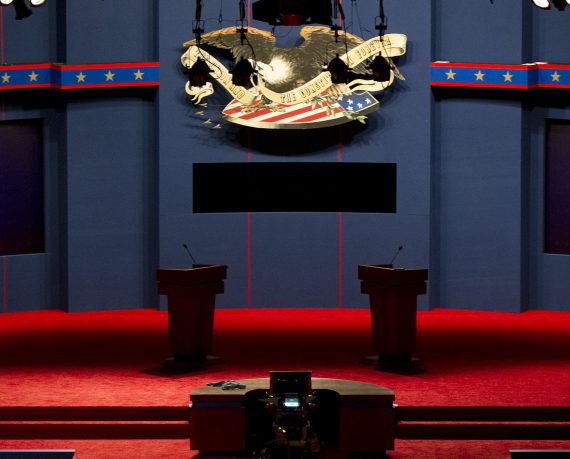

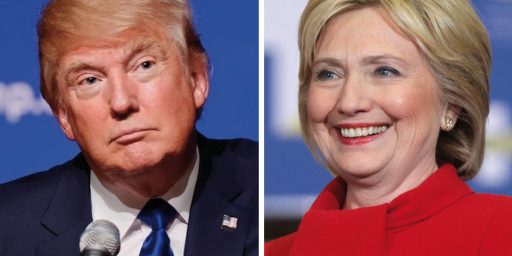

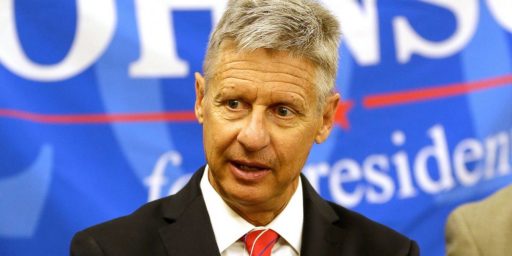
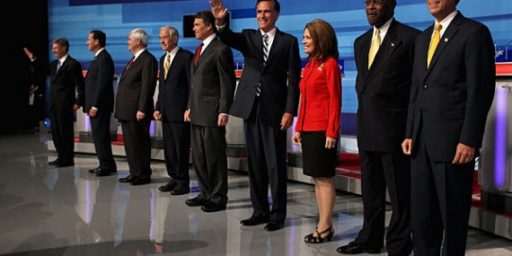
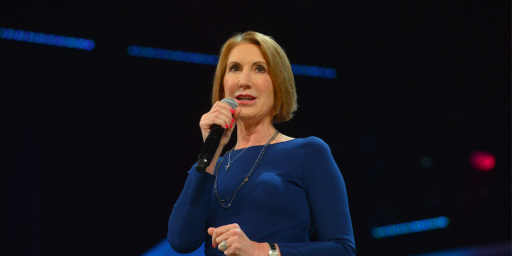
Good.
@dmhlt:
Because limiting the debate to two of the worst candidates ever put forward by any major political party is a good thing?
Everybody is subject to the 15% rule. Those candidates did not garner sufficient support to qualify. No conspiracy here.
Who said there was a conspiracy? I didn’t.
But you have to be incredibly naive to believe that a Commission controlled by the Democratic and Republican parties would not be biased toward excluding third-party candidates from the Presidential debates.
In a sane world, Trump would be below the 15%, and would also be excluded from the debates.
@Gustopher:
Yes, he would. But apparently we no longer live in a sane world, if we ever did.
@Doug Mataconis:
Look on the bright side. Now Trump has to go one-on-one with HRC, and his abysmal ignorance, disqualifying character flaws, and inability to articulate any consistent coherent position on any subject whatsoever won’t be buffered by the presence of a third or fourth person on the stage.
@Doug Mataconis: Trump is THE worst candidate ever put forward (or at least in modern times). Anything that might allow him to win is a bad thing. And no, Clinton is nowhere near as bad as he is. She’s actually pretty good. She’s much better than GWB, for example. The “both sides” shtick is really tiresome in this particular case, especially when Trump is clearly so horrible.
They’ve had months to make themselves known. Given what we’ve seen with this campaign season so far, they can’t even use the excuse of little to no funding to blame since Trump’s been getting it for free from day one. Scare up a headline by doing something outrageous or something. In an age of internet and social media saturation, they shoulder the vast lion’s share of blame. If they’d splurged on those ads that play before Youtube videos now for a month…. They’re wannabes and the world knows it – so no primetime for them.
It’s their job as candidates to put themselves out there and make themselves known. The press owes them nothing, the internet owes them nothing, the public owes them nothing. If they can’t accomplish people knowing their frigging names, why in the hell should we trust them with the Oval Office? Can’t even come across as a viable alternate to two controversial candidates to the point where over 50% of people don’t know you exist with months of prep time? Stage time is earned and they didn’t make the cut.
@Doug Mataconis:
So your theory is two more twits will make it better?
Doug, we have the debates to choose between candidates for president. We do not hold the debates to hear the views of random crackpots, which is what Johnson and Stein are. This is serious business, and neither of them is ever going to be president.
The trouble is, if you gripe about 15% as a bar and want to bring it down to 5%, there’s going to be some other slob who can logically argue “Why 5%? Why not 3%?”
They’re equally arbitrary cut-offs. If the 15% bar had been put into place only recently the disqualified candidates might have a more reasonable argument. As it is, they just sound like sore losers.
To be honest, Johnson is the closest thing we could have to representing a right-wing viewpoint at the debates. Hillary obviously takes care of the middle-left. Trump (and I’m paraphrasing something that James Joyner said) will present whatever fool thing pops in his head.
@Franklin: For the record, I’m open to other people from other parties getting their views into the discourse. Especially in Congress.
Johnson is only half right-wing viewpoint. In many ways, he’s anathema to the right. That’s where the left-right “score” breaks down. (I like some of his views, but not most of the libertarian stuff.)
@Doug Mataconis:
So, according to you, two of the worst candidates every put forward by any major political party, and yet Johnson fails to reach 15% against, again, two of the worst candidates every put forward by any major political party, according to you.
The GOP: White people who care only for billionaires and suffer a form of blindness that renders minorities invisible. Also poor people. And women. In short: assholes.
Tea Party: A subset of Republicans who long for the good old days of slavery. In short: racist assholes.
The Libertarian Party: Teen-aged white males who think less government regulation is needed to get them out of their mom’s basement. In short: narcissist assholes.
The Democratic Party: People who love everyone but white males, are tolerant of everyone but white males, and are incapable of prioritizing. In short: nitwits.
The Green Party: Smug, joyless, humorless bores who hate everything that turns a profit. In short: self-righteous assholes.
Trumpists: Racists and woman-haters who believe they’ll win at three card monte if they just stick with it. In short: even dumber Tea Partiers.
This is why I’m a Democrat: I prefer a nitwit to an asshole. Democrats may be dumb, disorganized, obnoxiously righteous, a bit corrupt, confused and insufferable, but they don’t set out to hurt anyone except the people who have the money and the power.
Republicans, libertarians, Trumpists, Tea Partiers, they are all actually trying to hurt people. They want to hurt African-Americans, Hispanics, Muslims, LGBT folks, women of child-bearing age, the poor and the sick.
In short, Democrats punch up and the GOP, TP and Cheetoh Jesus cult, all punch down.
I will never be with the people who punch down. I don’t understand why anyone would be. I don’t understand how you belong to a party that sets out to shit on the weak and still have a shred of self-respect. But then, I’m a Democrat.
@michael reynolds: How about the southern wing of the Democrat Party ?
@Tyrell:
“How about the southern wing of the Democrat Party ?”
Made up almost entirely of blacks. In many Southern states, Democrats don’t get 20% of the white vote.
@Doug Mataconis: “Because limiting the debate to two of the worst candidates ever put forward by any major political party is a good thing?”
First, bullsh*t.
Second, the standards were set a long time ago, and for good reason – or don’t you remember the GOP primary Klown Kar Kalvalcade this spring?
This is clearly a conspiracy of the alcohol industry, who want to make sure that the debates just make us all go out and drink ourselves to death.
@Barry:
Yes, the standards were set that way after Ross Perot upset the applecart in 1992 and the reason for the change was that the major parties wanted to cement their duopoly over American politics.
@Doug Mataconis:
And neither Johnson or Stein could get anywhere near 15% support against these supposed losers? What does that make Johnson and Stein?
I ‘ll tell you: hopeless candidates pushing crackpot ideologies.And I don’t see why they should be part of a debate for maybe the most important leadership role in the world. The debates aren’t a college debate bull session, and I have no time for someone whose party’s stated position
is to abolish all “unconstitutional” agencies ( starting with IRS) and someone else who wants to “Establish the right of every state, county, and municipality to restrict or prohibit the production, sale, distribution, storage, or transportation of any substance it designates as dangerous or toxic.”
Time for serious business.
The problem is that Third Party Candidates affect the balance of the debate. Hillary would be facing attacks from three candidates if Stein and Johnson were participating in the debate, and without a criteria you would have candidates demanding or blocking Third Party Candidates purely to take advantage in the debate.
Third PartyCandidates Who Didn’t Qualify And Who Are Crackpots Excluded From Presidential, Vice-Presidential DebateFixed that for you.
You’re welcome.
@Moosebreath: I think he’s pushing ðe olde ‘but the Dixiecrats!’ meme, never mind that they are all either a) dead now, or b) Republicans now.
@Doug Mataconis:
It’s good to see you weren’t worrying your beautiful mind back in 2000 Doug!
@Franklin: “To be honest, Johnson is the closest thing we could have to representing a right-wing viewpoint at the debates. Hillary obviously takes care of the middle-left. Trump (and I’m paraphrasing something that James Joyner said) will present whatever fool thing pops in his head.”
That is the right-wing viewpoint. Thought and rationality are nice-to-haves, on a good day.
@Hal_10000: “Yes, the standards were set that way after Ross Perot upset the applecart in 1992 and the reason for the change was that the major parties wanted to cement their duopoly over American politics.”
The bar was set rather low; I believe that Perot would have cleared it.
Trump has again talked about Clinto being assassinated last night in Miami.
And Doug is still on his “.both sides” schtick.
WTF???
@Doug Mataconis:
So there is a conspiracy?
Imagine 2 years ago, if you’d said, “Well, the former republican governor won’t be allowed in the debates, but Donald Trump will, of course.”
People would have thought you were crazy. At that time, only Norm Ornstein, Paul Krugman, and a few others would admit that the GOP was a Basket of Deplorables.
@michael reynolds:
You forgot
The Socialists – who favor the office holder. In short: kleptocrats
“At least, those who are not office holders will, under Socialism, have the hardest kind of a time.” Although, that sentence isn’t completely true, we do see the cronies of the officeholders do quite well.
The Deplorables are constantly abused by officials as social traitors. Such is common under the dominion of social democrats or democratic socialists.
@JKB:
The deplorables are abused as social traitors because they are racists and misogynists. You hate people by race and/or gender. You seek to use the power of government to harm those people, to restrict or belittle or disadvantage them because your own weakness makes you into a bully.
That’s why you’re the “deplorables.” Because you are deplorable. Stop being racist. Stop being sexist. Stop despising people different from yourself. Let go of your tribal instincts and join the 21st century. Then you won’t be deplorable.
@Hal_10000:
If you play The Drinking Game at the first debate, and all the participants are required to take a shot each time Trump says something asinine/repellent/demented, everyone should be passed out on the floor within fifteen minutes.
Your first paragraph ends:
This reminds me of the Clinton Foundation stories that conclude in the third paragraph that nobody did anything wrong, then inexplicably continue for ten more paragraphs.
My cat and I have also been excluded from the debates.
If people really got to know my cat, and see her responses to the issues of our times, I am sure that they would all come around and start supporting her. She’s endearing (in a one eyed way), looks very dapper (tuxedo), and has a compelling personal story (she’s a cat). She also has as much chance of being the next president as any of the third party candidates.
I am a somewhat less viable candidate than my cat, but also have exactly as much of a chance as any of the third party candidates.
@Barry:
Not before the first debate he wouldn’t. Johnson is actually polling higher than Perot was before the debates.
@Gustopher:
That’s a shame. I read you all the time, but I’d love to hear your cat’s insights on spaying, canned vs. dry, indoor vs. outdoor and other important issues of the day.
Uh huh…forget 19%, does anyone think he is going to get even a double digit percentage of the vote in November…
I have had the pleasure to watch two different four-party, four-person debates, and have seen what it is like when it goes well, and how horrible it is when it doesn’t.
First, the bad: the 2002 Massachusetts gubernatorial race. Mitt Romney vs. three women. The Democrat was snarky and obnoxious, the Independent was ignorant and uninformed, and the Green candidate – none other than Jill Stein – was in lala land. On that stage, only Romney seemed like a credible future governor.
The good: the 2006 Massachusetts gubernatorial debate. The Republican was Romney’s lieutenant governor, the Democrat was Deval Patrick, who would go on to win; the Green candidate was a Boston-area social worker, and the Independent, IIRC, was the state auditor. Two women and two men.
Each of the four was well-informed and eloquent, and the debate was substantive and respectful. They each had a different focus – fiscal responsibility from the Republican, an economy that works for everyone from the Democrat, care and compassion for the poor from the Green, and ethics and accountability from the Independent. Yet they all acknowledged the importance of the points their opponents were making. It led one newspaper pundit to write the next day, “It’s too bad we can’t elect all four of them.”
Do we have four candidates as good as those who ran for Massachusetts governor in 2006? Well, since one is Trump and another is Stein…
@Monala: Watched the other day the chair of PDC say that the role of the moderator was to ask a question and then “step out of the way” and let the candidates argue. And the Commission has dropped the time limits (90 sec, followed by 60 second rebuttal), thereby allowing the candidates more time to present the details of their position.
I’m fearful that the “debate” will devolve to the “discussions” that we have so often seen between surrogates on cable channels, with everyone talking at the same time and the listeners unable to follow most of it.
Also wouldn’t be surprised to see confrontations like this: Trump says Clinton started the birther thing. (takes 5 seconds to say this). In response Clinton says either “Did not” (takes 3 seconds) or Clinton explains (consuming 90 seconds) why this charge is false. In the former case, the audience has not learned anything; in the later case 95 seconds of debatetime has been wasted.
I’m hoping that I’m wrong, as I really would like to see a comprehensible and substantive debate on issues. It seems to me that each candidate has very different philosophic approaches to maintaining the “greatness/goodness” of our country. Simple example: the role of government regulations in the business world (for example, should food safety regulations be loosened or abandoned).
@Hal_10000: “Not before the first debate he wouldn’t. Johnson is actually polling higher than Perot was before the debates.””
OK.
@Hal_10000:
That may be technically true, but even if so, that ‘s a pretty deceptive way of putting it.
In 1992, before he withdrew, Perot was a major player in the race, polling in the 20s and 30s, IIRC. Wikipedia says that he withdrew after his support fell to 20%. While he was out of the race his support fell further (and your claim may be technically true if his support bottomed out below Johnson’s peak), but comparing the support for an active candidate against a (temporarily) withdrawn one is ridiculous.
Had he simply stayed in the race throughout, Perot would have had no trouble clearing the 15% threshold. There are other arguments you could make against that threshold, but Perot isn’t one of them (unless you believe the commission has some special obligation to accommodate candidates that exit and re-enter the race, I suppose).
@michael reynolds: The cult of the Presidency is strong in you Michael.